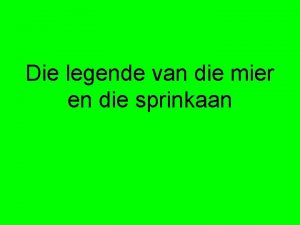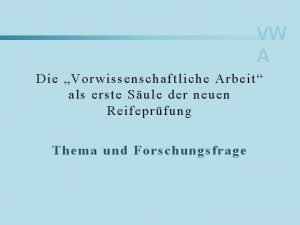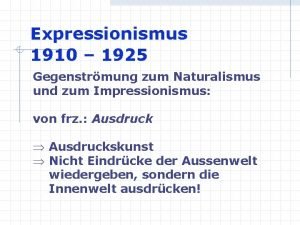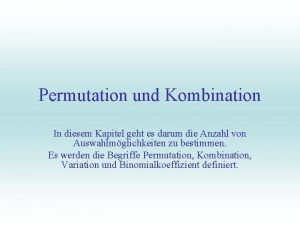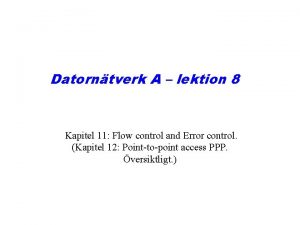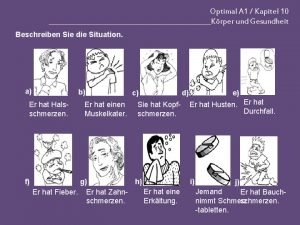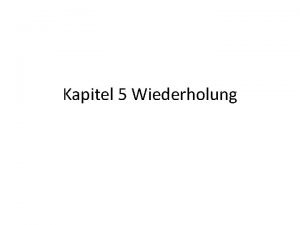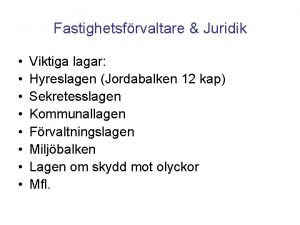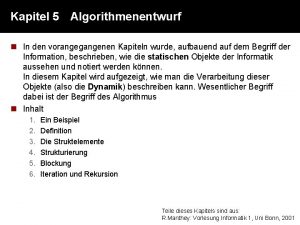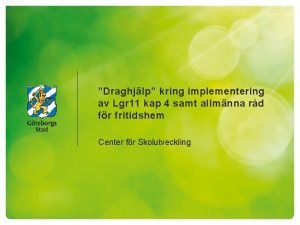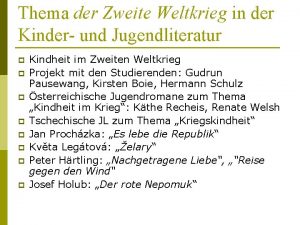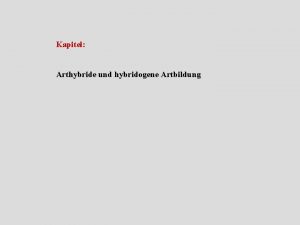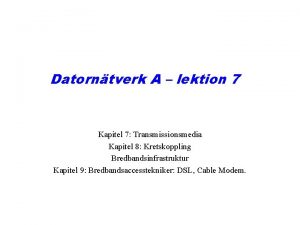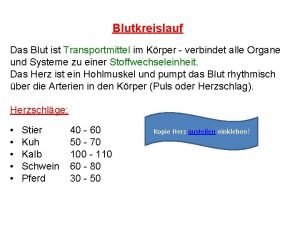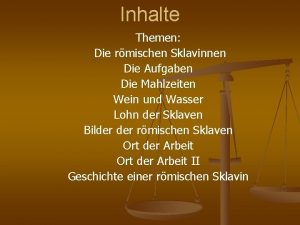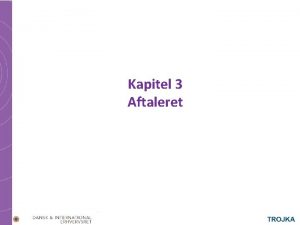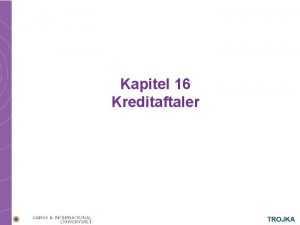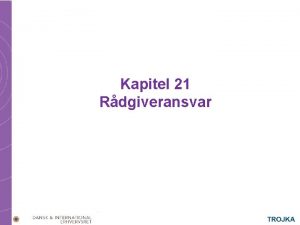KAPITEL 7 UNTERWEGS DIE THEMEN Geografie Transportmittel das






































- Slides: 38

KAPITEL 7 UNTERWEGS

DIE THEMEN Geografie Transportmittel das Auto Reiseerlebnisse Grammatik: relative clauses making comparisons (the comparative and superlative forms of adjectives and adverbs) Referring to and asking about things and ideas: da-compounds and wo-compounds review: the perfect tense and the simple tense of haben and sein

GEOGRAFIE-SPIEL Wie heiβt der gröβte Berg in Neuseeland? Was ist der schönste Strand in Neuseeland? Was ist der längste Strand in Neuseeland? Was ist der schönste See in Neuseeland? Was ist die schönste Bucht in Neuseeland? Was ist der schönste Hügel in Neuseeland? Was ist das schönste Stadtteil in Auckland?

Die Donau ist der Fluss, der durch Wien flieβt. Die Ostfriesischen Inseln sind Inseln, die vor der Küste von Ostfriesland liegen.

RELATIVE CLAUSES Relative clauses add information about a person, place, thing or idea, that has already been mentioned in the sentence. The relative pronoun begins the relative clause, which usually follows the noun it describes. The relative pronoun corresponds to the English words: who, whom, that and which. The conjugated verb is in the end position. refers to the noun relative clause Der Atlantik ist das Meer, das Europa und Afrika von Amerika trennt. relative pronoun conjugated verb in last position The Atlantic is the ocean, that separates Europe and Africa from America.

RELATIVE CLAUSES While relative pronouns may sometimes be omitted in English, they cannot be omitted from German sentences. Das ist der Mantel, den ich letzte Woche gekauft habe. That is the coat (that) I bought last week. Likewise, the comma is not always necessary in an English sentence, but it must percede a relative clause in German. If the relative clause comes in the middle of a German sentence, it is followed by a comma as well. Der See, der zwischen Deutschland und der Schweiz liegt, heiβt Bodensee. The lake that lies between Germany and Switzerland is called Lake Constance.

RELATIVE PRONOUNS IN NOMINATIVE CASE In the nominative case, the forms of the relative pronouns are the same as the forms of the definitve articles der, die, das Der Mantel, der an der Tür hängt, ist meiner. Gobi heiβt die Wüste, die in Innerasien liegt. masculine der Mann, der … the man who … neuter das Auto, das … the car that … feminine die Frau, die … the woman who … plural die Leute, die … the people who …

RELATIVE PRONOUNS IN ACCUSATIVE AND DATIVE CASE When the relative pronoun functions as an accusative or dative object within the relative clause, then the relative pronoun is in the accusative or dative case, respectively. Accusative: Der Mount Everest ist ein Berg, den nur wenige Menschen bestiegen haben. Dative: Mein Vater ist der einzige Mensch, dem ich nichts davon erzählt habe. masculine neuter feminine Plural Accusative den das die Dative dem der denen

RELATIVE PRONOUNS FOLLOWING A PREPOSITON When a relative pronoun follows a preposition, the case is determined by that preposition. The gender and number of the pronoun are determined by the noun. Mein Bruder ist der Mensch, mit dem ich am liebsten spreche. Rügen ist eine Insel in der Ostsee, auf der weiβe Kreidefelsen sind. The preposition and the pronoun stay together as a unit in German. Wer war die Frau, mit der ich dich gestern gesehen habe?

ÜBUNG MIT RELATIVSÄTZEN 1. Das ist der Mann, … a. Er sieht gern fern. b. Ich sehe ihn oft im Bus. c. Ich habe ihm mein Fahrrad geliehen. d. Bei ihm kaufe ich immer Blumen. a) Das ist der Mann, der gern fernsieht. b) Das ist der Mann, den ich oft im Bus sehe. c) Das ist der Mann, dem ich mein Fahrrad geliehen habe. d) Das ist der Mann, bei dem ich oft einkaufe.

ÜBUNG MIT RELATIVSÄTZEN 2. Das ist die Frau, … a. Sie arbeitet im Krankenhaus. b. Ich habe sie gestern angerufen. c. Ihr gefallen die Blumen nicht. d. Mit ihr gehe ich manchmal ins Kino. a) Das ist die Frau, die im Krankenhaus arbeitet. b) Das ist die Frau, die ich gestern angerufen habe. c) Das ist die Frau, der die Blumen nicht gefallen. d) Das ist die Frau, mit der ich manchmal ins Kino gehe.

ÜBUNG MIT RELATIVSÄTZEN 3. Das ist das Kind, … a. Es singt immer sehr laut. b. Ich bringe es in die Schule. c. Ihm gehört der kleine Hund. d. Mit ihm gehe ich einmal im Monat zum Spielplatz. a) Das ist das Kind, das immer sehr laut singt. b) Das ist das Kind, das ich zur Schule bringe. c) Das ist das Kind, dem der kleine Hund gehört. d) Das ist das Kind, mit dem ich einmal im Monat zum Spielplatz gehe.

ÜBUNG MIT RELATIVSÄTZEN 4. Das sind die Leute, … a. Sie sind gestern nach Bremen gezogen. b. Ich habe sie zu meiner Party eingeladen. c. Niemand hört ihnen zu. d. Bei ihnen wohnt meine beste Freundin. a) Das sind die Leute, die gestern nach Bremen gezogen sind. b) Das sind die Leute, die ich gestern zu meiner Party eingeladen habe. c) Das sind die Leute, denen niemand zuhört. d) Das sind die Leute, bei denen meine beste Freundin wohnt.

RELATIVSÄTZE – WIEDERHOLUNG Setzen Sie das richtige Relativpronomen ein. die 1. Die Freundin, _____ ich jeden Freitagabend treffe, heißt Anja. das 2. Eine Katze ist ein Tier, _____ viele Leute mögen. der 3. Die Müllers sind die Familie, ______ ich immer bei der Gartenarbeit helfe. denen 4. Meine Geschwister sind Personen, ______ ich gern kleine Gefälligkeiten mache. dem 5. Am Fenster steht der Stuhl, ______ ein Bein fehlt. den 6. Der Einzige, ______ ich nicht auf meine Party eingeladen habe, ist Timo.

EINE BAHNFAHRT ONLINE BUCHEN Wohin möchten Renate und Mehmet fahren? Wann müssen sie da sein? Wann fährt der ICE ab? Wann kommt er in Müchen an? Fahren Mehmet und Renate erster oder zweiter Klasse? Wieviel kostet die Fahrt pro Person?

ROLLENSPIEL S 1: Sie stehen am Fahrkartenschalter im Bahnhof von Bremen und wollen eine Fahrkarte nach München kaufen. Sie wollen billig fahren, müssen aber vor 16: 30 Uhr am Bahnhof in München ankommen. Fragen Sie, wann und wo der Zug abfährt und über welche Städte der Zug fährt. S 2: Sie arbeiten am Fahrkartenschalter im Bahnhof von Bremen. Ein Fahrgast möchte eine Fahrkarte nach München kaufen. Hier ist der Fahrplan. Alle Züge fahren über Hannover und Würzburg. Abfahrt Ankunft 2. Klasse 1. Klasse IC 4: 25 15: 40 109 Euro 169 Euro ICE 7: 15 14: 05 116 Euro 182 Euro IC 7: 30 20: 45 109 Euro 169 Euro

NUMMERNSCHILDER

REFERRING TO THINGS 1. To refer to people, we use personal pronouns - Was macht deine Schwester gerade? Sie spielt gerade Tennis. - Wer sitzt neben deiner Schwester? Tina sitzt neben ihr. 2. To refer to things or concept, we normally also use personal pronouns - Wo ist die Hupe? Sie ist auf dem Lenkrad.

REFERRING TO THINGS In both German and English, personal pronouns are used directly after prepositions when these pronouns refer to people or animals. Ich werde bald mit ihr sprechen I will talk to her soon When de object of the preposition is a thing or concept, it is common in English to use the pronoun it or them with the preposition: with it, for them …

DA- COMPOUNDS In German, it is preferable to use compounds that begin with da- (or dar- if the preposition begins with a vovel) da + r + VOWEL darauf daran darin darunter daraus darum darüber da + CONSONANT daneben dahinter davor dazwischen damit dazu davon dabei danach

REFERRING TO THINGS dadurch dafür dagegen dahinter damit daneben darauf daraus darin darüber darunter davon davor dafür dazu dazwischen → → → → → through it/them for it/them against it/them behind it/them with it/them next to it/them on top of it/them out of it/them in it/them over it/them underneath it/them from it/them in front of it/them for it/them to it/them between it/them Was macht man mit einer Hupe? Man warnt Leute damit. Hast etwas gegen das Rauchen? Nein, ich habe nichts dagegen.

FRAGEPRONOMEN UND RELATIVPRONOMEN 1) _____ würdest du niemals dein Auto leihen? Die Person, ______ ich niemals mein Auto leihen würde, ist _______, weil____________________. 2) _____ würdest du nicht zu deiner Geburtstagsparty einladen? Die Person, _____ ich nicht zu meiner Geburtstagsparty einladen würde, ist ____, weil ___________. 3) _____ ist dein großes Vorbild? Die Person, _____ mein großes Vorbild ist, ist _____ weil __________________________.

BUCH S. 247 / SITUATION 9 Worauf setzt man sich? Womit lenkt man das Auto? Womit warnt man andere Fahrer und Fuβgänger? Womit hört man Musik und Nachrichten? Womit fährt man das Auto? Worin ist das Benzin? Womit hält man den Wagen an?

ASKING ABOUT THINGS AND IDEAS Questions about people begin with wer (who) or wen/wem (whom). If a preposition is involved, it precedes the question word. Mit wem gehst du heute ins Theater? → Mit Melanie. In wen hast du dich diesmal verliebt? → In Melanie. Questions about things and concepts begin with was (what). If a preposition is involved, German speakers use compound words that begin with wo- (or wor- if the preposition begins with a vovel). Womit fährst du nach Berlin? → Mit dem Bus. Worüber sprichst du? → Über den neuen Avatar Film.

WO-COMPOUNDS wo + r + VOWEL worauf woran worin worunter woraus worum worüber wo + CONSONANT woneben wohinter wovor wozwischen womit wozu wovon wobei wonach

ASKING ABOUT PEOPLE AND THINGS People Things and Concepts mit wem von wem zu wem → womit → wovon → wozu an wen für wen über wen auf wen um wen → → → woran wofür worüber worauf worum

COMPARATIVE Comparisons of Equality: so … wie To say that 2 or more persons or things are alike or equal in some way, use the phrase so … wie (as … as…) with an adjective or adverb. Deutschland ist ungefähr so groβ wie Spanien. Germany is about as big as Spain. Der Mount Cook ist fast so hoch wie das Matterhorn. Mount Cook is almost as high as the Matterhorn.

COMPARATIVE Comparisons of Inequality: nicht so … wie Inequality can also be expressed with this formula and the addition of nicht: nicht so … wie (not as … as…) with an adjective or adverb. Die Zugspitze ist nicht so hoch wie der Mount Everest. The Zugspitze is not as high as Mount Everest. Österreich ist nicht ganz so groβ wie Neuseeland. Austria is not quite as big as the New Zeland.

COMPARATIVE Comparisons of Superiority and Inferiority: To compare 2 unequal persons or things, add –er to the adjective or the adverb. Note that the comparative form of German adjectives and adverbs always ends in –er, whereas English sometimes uses the adjective with the word more. Ein Fahrrad ist billiger als ein Motorad. A bicycle is cheaper than a motorcycle. Lydia ist intelligenter als ihre Schwester. Lydia is more intelligent than her sister.

COMPARATIVE Comparisons of Superiority and Inferiority: Some adjectives the comparative teuer → dunkel → that end in –el and –er already drop the -e in form. teuerer dunkeler Eine Wohnung in Regensburg ist teuer, aber eine Wohnung in München ist noch teurer. An apartment in Regensburg is expensive, but an apartment in Munich is even more expensive.

COMPARATIVE -EXCEPTIONS Exceptions / irregular comparative forms The following adjectives have an umlaut in the comparative form alt gesund groβ jung kalt krank kurz lang warm → → → → → älter gesünder gröβer jünger kälter kränker kürzer länger wärmer As in English, some forms are very different from their base forms: gern gut hoch nah viel → lieber → besser → höher → näher → mehr

VERGLEICHE Alter? Gröβe? Gewicht? Intelligenz? Schönheit? sportlich? religiös? konservativ? tierlieb? schnell? …

SUPERLATIVE The superlative: To express the superlative in German, use the contraction am with the predicate adjective or adverb plus the ending –sten Ein Porsche ist schnell, ein Flugzeug ist schneller und eine Rakete ist am schnellsten. A Porsche is fast, an airplane is faster and a rocket is the fastest. Unlike the English superlative, which has 2 forms, all German adjectives form the superlative this way. Hans ist am jüngsten. Monika ist am hübschsten → Hans is the youngest. → Monika is the prettiest

SUPERLATIVE When the adjective or adverb ends in –d or –t, or an ssound such as –s, – β, – sch, – x or –z … an – e – is inserted between the stem and the ending -sten frisch gesund heiβ intelligent → → am am frischesten gesündesten heiβesten intelligentesten groβ → am gröβten (that is an exeption)

SUPERLATIVE Exeptions / irregular comparative and superlative forms The following adjectives have an umlaut in the comparative and superlative form alt gesund groβ jung kalt krank kurz lang warm → → → → → älter gesünder gröβer jünger kälter kränker kürzer länger wärmer → → → → → am am am ältesten gesündesten gröβten jüngsten kältesten kränkesten kürzesten längesten wärmsten

COMPARATIVE AND SUPERLATIVE Exeptions / irregular comparative and superlative forms As in English, some superlative forms are very different from their base forms: gern gut hoch nah viel → → → lieber besser höher näher mehr → → → am am am liebsten besten höchsten nächsten meisten

SUPERLATIVE Superlative forms perceding nouns When the superlative form of an adjective is used with a definite article (der, die, das) directly before a noun, it has an –(e)ste ending in all nominative singular forms and –(e)sten ending in the plural form. Fluss (m) Nominative der längste Tal (n) das tiefste Wüste (f) die gröβte Berge (pl) die höchsten

SIMPLE PAST TENSE OF HABEN UND SEIN When talking about events that have already happened, people commonly use the verbs haben und sein in the simple past tense instead of the perfect tense. in spoken German, the simple past is perceived as formal. Colloquial narratives often use the perfect tense. sein haben ich war wir waren ich hatte wir hatten du warst ihr wart du hattest ihr hattet er, sie, es war sie waren er, sie, es hatte sie hatten Sie waren Warst du schon mal im Ausland? Letzte Woche hatte ich einen Unfall. Sie hatten → Have you been abroad? → Last week I had an accident.
 Korinthisieren
Korinthisieren Brief an die galater kapitel 6
Brief an die galater kapitel 6 Der gang vor die hunde kapitel zusammenfassung
Der gang vor die hunde kapitel zusammenfassung Emil und die detektive kapitel 12 zusammenfassung
Emil und die detektive kapitel 12 zusammenfassung Das doppelte lottchen zusammenfassung
Das doppelte lottchen zusammenfassung Die storie van die mier en die sprinkaan
Die storie van die mier en die sprinkaan Jesus christus spricht ich bin das licht der welt
Jesus christus spricht ich bin das licht der welt Themen smalltalk
Themen smalltalk Neue sachlichkeit historischer hintergrund
Neue sachlichkeit historischer hintergrund Sozialpsychologie themen
Sozialpsychologie themen Prüfungsprojekt
Prüfungsprojekt Gute vwa themen
Gute vwa themen Sensible themen beispiele
Sensible themen beispiele Kernlehrplan nrw mathematik
Kernlehrplan nrw mathematik Dsd 1 beispiele
Dsd 1 beispiele Hausarbeit 10 klasse realschule themen
Hausarbeit 10 klasse realschule themen Baumdiagramm tennis
Baumdiagramm tennis Mitarbeiterversammlung themen
Mitarbeiterversammlung themen Naturalismus textbeispiel
Naturalismus textbeispiel Sicherheitskurzgespräch
Sicherheitskurzgespräch Permutation und kombination
Permutation und kombination Mirjam pressler bitterschokolade zusammenfassung
Mirjam pressler bitterschokolade zusammenfassung Control kapitel
Control kapitel Kallocain handling
Kallocain handling Kapitel
Kapitel Ronja räubertochter zusammenfassung für kinder
Ronja räubertochter zusammenfassung für kinder Good pizza great pizza kapitel 3
Good pizza great pizza kapitel 3 Markusevangelium kapitel 10
Markusevangelium kapitel 10 Kapitel 5 lektion a answers
Kapitel 5 lektion a answers Jb kap 12
Jb kap 12 Im vorangegangenen kapitel
Im vorangegangenen kapitel Lgr 11 kapitel 4
Lgr 11 kapitel 4 Markus kapitel 16
Markus kapitel 16 Lena unser dorf und der krieg zusammenfassung
Lena unser dorf und der krieg zusammenfassung Kapitel
Kapitel Qmhandbuch überlingen
Qmhandbuch überlingen Hiob kapitel 42
Hiob kapitel 42 The australian connection zusammenfassung kapitel 7
The australian connection zusammenfassung kapitel 7 Fliegender stern kapitel 5
Fliegender stern kapitel 5





